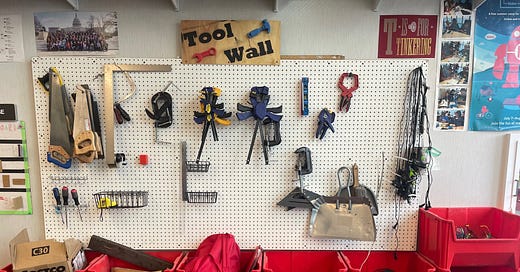10 things that Silicon Valley parents know about smartphones that you don’t.
It’s time to level the playing field...
In Spring this year, I travelled to Silicon Valley and other parts of California for a month to investigate the relationship between smartphones and young people’s mental health as part of my Churchill Fellowship. I started this newsletter on my return to share some of what I learned but I soon realised that I had learned so much that I could - literally - fill a book!
This newsletter had to take a back seat while over the summer I focused on writing that book proposal – and the great news is that it was successful … My book about smartphones for parents will be out in early 2026 with the wonderful publishers, Profile Books. I’ve since been busy planning and writing this Autumn / Winter. You can expect a positive, empowering, non-judgmental guide about your child’s first smartphone – no fear-mongering, just facts and helpful advice.
With the book still over a year away, my plan is to share as many useful insights and practical tips as I can via my new Instagram account @laurawyattsmith and with occasional newsletters. Meanwhile, I thought it would be good to finish 2024 off with a summary of headline findings from my trip so that you can see what has inspired me to support parents more with this topic.
Here are ten things that Silicon Valley parents know about smartphones that you might not. If you want to know more about how to embrace technology while keeping your children safe online, please give me a follow on Instagram @laurawyattsmith.
1) Consumption and creation of technology are two totally different things – If you want to raise the next Steve Jobs, then little Steve needs to be out in the real world, identifying and solving problems and developing his creative thinking skills, not simply playing games made by others. This is why Silicon Valley types send their kids to digitally minimalist schools and encourage them to hang out at ‘maker spaces’ at the weekends, places where children (and adults) enjoy tinkering with real life tools to solve real world problems. Seriously – at one of the elite private schools I visited, their 18-year-old sons and daughters were taking crocheting classes, not coding. (I am told that in the future computers will code themselves)
2) It’s not just about seeing harmful content, but the nature of the online experience itself – The endless scrolling through of short form content impacts our attention span, especially during childhood when our children’s brains are still developing. Don’t kid yourself that so-called educational platforms are immune from this either – apps that gamify learning deploy the most compelling design features to cultivate your child’s behavioural habits in the name of education (for example, my child found Duolingo overwhelmingly stressful due to the pressure not to lose her ‘streak’, and that was before they added social features).
3) It’s not a fair fight – Thousands of the most brilliant and bright minds are working day and night to develop the most compelling design features to keep your child engaged with their smartphone. They pull out all the stops - bright colours and lights, flashing and buzzing notifications, social comparison cues, infinite scrolling features, and so much more to keep your child’s eyes locked on their screen. It doesn’t matter how ‘good’ or not your child is normally. They don’t stand a chance at self-regulating their phone use without your support and understanding.
4) They’re ‘addicted’ themselves – When you learn that even those who created this technology are struggling to self-regulate their own use, you know that this issue is bigger than you or me. It’s not about guilt or blame – it’s about seeing the bigger picture and working together, as a family, and as a community – to find a way through the digital maze that has been created.
Incidentally, it is worth noting that addiction is a divisive term and some Doctors debate whether screens can be addictive, using the medical definition. I get it and if it helps you to think of this as ‘obsessed with’ that works too. The point I am making is that despite our best intentions, we frequently find ourselves interacting with our smartphones compulsively, in ways that don’t serve our higher intentions.
5) They are struggling to keep their own kids offline too – Those who can afford private nannies and nurseries with wooden toys and forest school every day are fine. But the average non-millionaire techie parents are facing the same dilemmas as we are. I was struck how tech parents felt similarly conflicted, uncomfortable and out of control with how to parent their offspring through the digital world that they themselves helped to build. The pandemic was especially pivotal and problematic for many families.
6) Big Tech knows how to design better, safer technology for children, but won’t. I cover this topic more in my post, Your child’s rights and smartphone design. Big Tech has always put profit over people – after all, their whole business model is predicated on the idea of ‘moving fast and breaking stuff’, as Zuckerberg famously said … I was dismayed to find that principle still applies even when what they are breaking is your child’s mental health. Sure, trust your child, but don’t trust Big Tech. (After all, they don’t trust their products enough to give them to their own children, so why should you?)
7) Schools should be phone-free* spaces where children can (dis)connect and learn –The data on schools and phones is limited and mixed, and I have met academics who say that because of this, we don’t know definitively whether smartphones in schools help or hinder learning. I also get that for older children who are already obsessed with their smartphones, then taking them away may create issues around withdrawal. Yet, children and teachers tell me that when school ethos enables a truly smartphone free experience, children are better able to ‘be here now’. They play more, develop better social skills, and are happier. After all, if phone-free schools are the choice of Silicon valley’s elite – and now Eton, the elite £50,000+ a year boarding school that educated 20 of Britain's 55 prime ministers - then I think it’s fair to say there’s a good reason…
*Please note that by ‘phone-free’ I am referring to schools that either do not allow adult smartphones on the site at all or that require pupils to hand them in or lock them away. It is not the same as a ‘not-seen-not-heard policy’, which, in my view invites disciplinary problems as the temptation to check your phone when it remains within arms’ reach is overwhelming and unrealistic for most children.
8) Kid-friendly smartphones mean that children no longer need adult smartphones – The market is finally catching up with demand, and there is now a good range of more child friendly phones, which straddle the gap between a Nokia ‘dumb phone’ and a full-blown adult smartphone. Some of these have been available in USA for a long time, but many are brand new this year. They mean that if you want to track your child or give them access to music, banking, maps or journey planning apps without giving them unfettered access to the internet you can do that now. (Hooray!) Yes, they are more expensive than giving a hand-me-down old adult smartphone, but they are much cheaper than a new iPhone and will protect your child from a myriad of challenges.
9) AI is opening up a new world of parenting challenges. Using ChatGPT to cheat your homework is only the start. From deep fakes to humanised digital companions and the increasing blur between digital and virtual reality, the future is digital, and parents need to take an active interest in their children’s online lives if we are to be able to support and guide them through this virtual jungle.

10) The future belongs to those who can master technology, not serve it – Despite all of the challenges associated with smartphones, who would choose to be without theirs? While we may choose to delay the day our child gets an adult smartphone (and for good reason), nonetheless they will get one, one day. Our job as parents is to help them become the master of their devices, not the servant to them; to help them harness the best technology has to offer and avoid the worst. This is a challenging aspect of modern parenting, but essential if we are to keep up with the changing times, and to understand our whole child, including their digital selves, as well as the ‘IRL’ version of them that we know and love.
Thanks for reading, and before you go, one final thought…
I am delighted to see how the topic of smartphones and childhood has exploded in the media over 2024. It’s fantastic that awareness levels are so high thanks to public campaigns like #smartphonefreechildhood and TV programmes like #SWIPED on #channel4. I’ve also noticed some division and judgement emerging around this topic between those who are anxious about the implications of smartphone culture, and those who embrace technology as essential and don’t see what the fuss is all about.
There is a middle ground out there, where we avoid binaries and embrace nuance ... The data is complicated – screens and phones are not all good or all bad and there is not a one-size-fits-all solution. With my new Instagram account @laurawyattsmith I aim to offer well-informed, practical advice for parenting through the smartphone years with kindness and respect. I will also be sharing updates about my own journey and offering broader coaching tips and tools to support you with your own wellbeing as a parent, because when we are thriving, so can our kids. Hope to see you soon.
If you enjoyed this article, please remember to click subscribe to get the next edition.
Cheers,
Laura






Good read Laura. I remember years ago doing a session at Nickelodeon for all their staff and when I asked about devices, none allowed computers, tablets or similar in bedrooms and over half schooled children in tech free environments - Steiner and Waldorf schools. The best preparation for being tech savvy is playing outdoors with lots of stuff. Always!